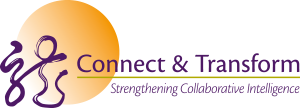The Dynamic Collaboration Deep Immersion Program offers in-depth, cutting-edge insights and highly relevant tools for individual, team, and organizational development. This relevance is a promise and a commitment to understanding and addressing leaders’ and organizations’ specific needs and interests, ensuring they can find the solutions they seek.
The Dynamic Collaboration approach provides leaders with practical frameworks to better manage complexity and achieve more integrated decision-making at every level. These tools are about managing unique contributions and empowering leaders to take control of their organizations’ future.
It’s built on three modules (taken individually or combined):
Module one. Next-level Thinking.
This module sharpens leaders’ decision-making through critical thinking frameworks and is designed to support executives in crucial leadership transitions, namely those related to the need to think and decide more broadly, let go of the ego, and realize stronger connections in collaboration from there on the other. It teaches leaders how to think more holistically and creatively. It covers contextual thinking, making sense of evolutions and change, defining critical relationships, and transformational thinking.
-
- Day One (25/10/2024): Foundations of Meta-systemic Thinking
- Morning: Introduce the four core principles of meta-systemic thinking: Whole system perspective, Dynamic change thinking, Assessing interconnectedness, and Transformation
- Afternoon: Practice applying whole system thinking to real-world challenges.
- Day Two (15/12/2024): Understanding Change and Relationships
- Morning: Explore how to analyze change and its impact on systems.
- Afternoon: Learn to identify and leverage critical relationships within a system.
- Day Three (6/12/2024): Transformational Thinking in Action
- Morning: Develop the ability to think beyond linear change and envision new possibilities.
- Afternoon: Apply learned concepts to a real-world case study
- Day One (25/10/2024): Foundations of Meta-systemic Thinking
Module two. Optimizing Your Organization.
Design your company for efficient collaboration and regenerative growth. We make a difference between designing your organization’s left and right wing. The left-wing is about how you split up the work and design units and jobs and is focused on the design of unique contributions at all levels as the basis to guarantee proactive ownership. The right-wing is about designing horizontal and vertical integration mechanisms to ensure coordinated action. This module teaches leaders how to design more effective and efficient organizations. It covers organizational design, job and unit design, and coordination and integration mechanisms.
-
- Day One (17/01/2025): Organization Design Fundamentals. Understand the core elements of organizational design, including:
- Evolutionary approaches to organizational structure
- Key design principles for defining jobs, units, and integration mechanisms
- Assessing the organizational structure dimension in current and future organizational value creation
- Day Two (7/02/2025): Designing for Ownership and Accountability. Focus on designing roles and units to:
- Empower employees and foster ownership
- Create clear accountability structures
- Choose the adequate KPI’s at each level in the organization
- Day Three 28/02/2025): Fostering Integration and Regeneration. Explore strategies for:
- Enhancing cross-functional collaboration
- Adapting integration mechanisms to changing environments
- Creating the conditions for regenerative organizational capital practices
- Day One (17/01/2025): Organization Design Fundamentals. Understand the core elements of organizational design, including:
Module three. Building High-Performing Teams.
Learn to create teams that leverage diverse perspectives and make firm decisions. We look at how teams integrate diverse perspectives and come to integrated decision-making, ensuring that projects and milestones are delivered on time and without rework. It covers collaborative intelligence, team learning, and conflict management topics.
-
- Day One (4/04/2025): Foundations of Collaborative Intelligence. Understand the concept of collaborative intelligence and its impact on team success. Explore key elements of effective team design, including:
- Leveraging diverse perspectives and maturity levels
- Effective problem-solving and decision-making
- Creating a feedback-rich environment
- Day Two (25/04/2025): Fostering Team Learning. Learn strategies for creating high-performing teams, including:
- Building psychological safety
- Designing effective team learning processes and avoiding downwardly divided dynamics
- Managing conflict constructively
- Day Three (16/05/2025): Embedding Collaborative Practices. Discover the role of different dialogical spaces in building and sustaining high-performing teams. Learn about:
- Aligning different dialogical spaces (from top to bottom and cross-functionally)
- Enhancing project management through collaboration
- Practical tools for embedding collaborative intelligence
- Day One (4/04/2025): Foundations of Collaborative Intelligence. Understand the concept of collaborative intelligence and its impact on team success. Explore key elements of effective team design, including:
Each module is a 3-day intensive spread over 2 months:
- Module one: 25/10, 15/11 and 6/12/2024
- Module two: 17/01, 7/2 and 28/02/2025
- Module three: 4/4, 25/4 and 16/5/2025
Ready to learn more? Contact jan@connecttransform.be for an intake and discuss how this program can benefit you.
Limited to 10 participants, prioritizing those enrolling in the full program.
Module Pricing:
- Per Module: €900 (excl. VAT)
- Full Program: €2400 (excl. VAT)
The program is organized at the offices of Connect & Transform, Koningin Astridlaan 144, 2800 Mechelen and facilitated by Jan De Visch, Martine Gorissen and Maarten Van Damme.
The training initiative can be adapted to specific business situations and challenges and orgnized in your company.
Our ultimate goal is to co-create sustainable individual, team, and organizational development paths with a co-creation team from your organization.

